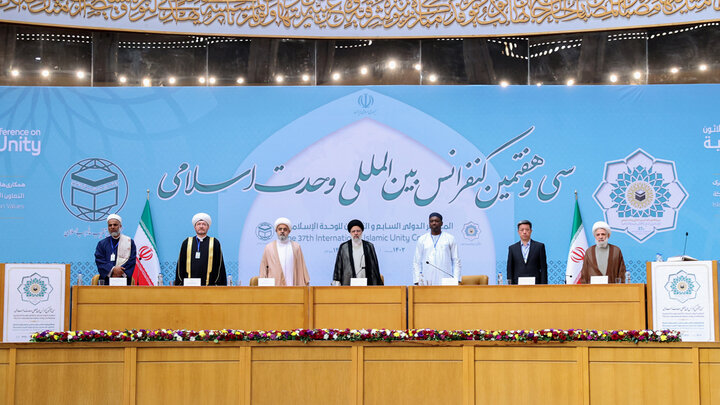Iran (IMNA) - Iranian President Ebrahim Raeisi declared that surrender and compromise are not viable options when dealing with the enemy, emphasizing the necessity of resistance. During his address at the 37th International Islamic Unity Conference (IIUC) on Sunday, Raeisi emphasized the critical importance of unity in the Islamic world. He asserted that unity extends beyond religious and geographical boundaries, encompassing the need for cohesion to safeguard the interests of the Islamic Ummah.
Raeisi attributed the historical victories of Muslims to their unity and adherence to the Quran and the Prophet's teachings. He cautioned against fulfilling the desires of foreign powers, warning of future regrets. The president underscored that the domination system recognizes the Islamic Ummah as its most formidable obstacle, as they embrace dynamism in their lives and perceive stagnation as a form of demise.
Highlighting the enemy's aversion to Islamic unity and cohesion, Raeisi emphasized that those who strive for unity align themselves with the strategic goals of Islam. Conversely, those who sow division inadvertently serve the enemy's agenda. Raeisi stressed that the freedom of al-Quds and Palestine serves as a paramount criterion for Islamic unity. He condemned any government's efforts to normalize relations with the Zionist regime, deeming it a regressive step dictated by foreign interests.
Furthermore, Raeisi asserted that surrendering or compromising with the enemy is no longer an option. Instead, he urged the utilization of resistance as a means to force the enemy into retreat.
He expressed that when dealing with the adversary, surrender and compromise are no longer viable options. Instead, he emphasized the importance of utilizing resistance to compel the enemy to retreat.
The 37th edition of the International Islamic Unity Conference (IIUC) commenced in Tehran, Iran, on Sunday.
The inaugural ceremony of this three-day conference took place in the presence of the Iranian President on Sunday morning.
The primary objective of the International Islamic Unity Conference is to foster unity and solidarity among Muslims, promote consensus among scholars and intellectuals to align their scientific and cultural perspectives, and propose practical solutions to achieve Islamic unity and a unified Islamic community across the Islamic world. It also aims to address the challenges faced by Muslims and provide suitable solutions.
The conference attendees consist of distinguished and knowledgeable individuals, including ministers from Muslim nations, scholars, muftis, university professors, as well as representatives from academic and cultural communities both within and outside the country. Numerous intellectuals, scholars, and reformers from around the globe, along with thousands of Shia and Sunni scholars from various parts of Iran, have participated in the conference, delivering lectures and sharing their insights. Additionally, Islamic thinkers from numerous countries, such as France, Syria, Lebanon, Australia, Egypt, Malaysia, Sudan, Pakistan, India, Azerbaijan, the UK, Jordan, Iraq, Indonesia, Gambia, Palestine, Afghanistan, Senegal, Libya, Bahrain, Algeria, Yemen, Greece, Turkey, Uganda, Kuwait, Qatar, the Netherlands, and the United Arab Emirates, have attended the International Islamic Unity Conferences.


Your Comment